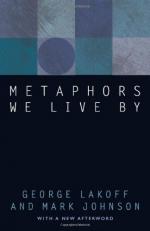|
This section contains 1,577 words (approx. 6 pages at 300 words per page) |

|
"Metaphors" have an emotive force and aesthetic dimension that have long been recognized. What has made metaphor so compelling to contemporary philosophers, however, has been its importance to cognition. Aesthetics and philosophy of religion are no longer the sole province of the study of metaphor. Instead, most of the research is located in philosophy of language, philosophy of science, and cognitive science. The ubiquity of metaphor and its contribution to all forms of discourse, the apparent anomaly of metaphor in light of standard accounts of language, and the increased interest by philosophers in providing theories for natural (rather than formal or artificial) languages have made an account of metaphor an important criterion of adequacy for theories of language. The limits of literality have similarly been felt in accounts of science and cognition. Max Black's (1962) seminal work connecting the use of scientific models to metaphors opened an area of...
|
This section contains 1,577 words (approx. 6 pages at 300 words per page) |

|


